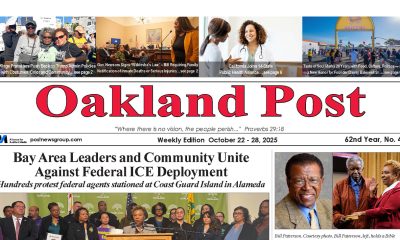Opinion
OP-ED: Don’t Judge this Book by its Cover
I am a 56-year-old Black man who has read a total of five books in my life. I simply do not like reading books. Now before you get too excited, I have read the Holy Bible, cover to cover, have you? I believe the Bible is the soap for the heart and I encourage all to search out and apply its wisdom as soap, not man’s myths or biblical customs in an attempt to clean up one’s life.
Why has it been so easy to buy into the myths that Adam and Eve were the “First” people on earth and that Adam and Eve ate an “Apple”, but when it comes to reading, “Love one another”, too many of us act illiterate?
Recently, I walked into Marcus Books; the oldest Black owned book store in the country, located in the Fillmore district of San Francisco. Karen Johnson, who runs the SF store (There is a Marcus Books, Oakland) held up a book for me to read. Reading the title, I thought to myself, get real and then, this woman has lost her mind. I was offended by the title: “What is Wrong with Being Black?”
If there is one good quality about me, it is the fact that when I get offended, I do not run or lash out. Therefore, I took the book and thumbed a few pages. But I purchased it out of curiosity. This erudite Black London preacher and author, Matthew Ashimolowo, born in Nigeria pastors the largest church in Western Europe and he got me to read his 344 page book, by insulting me first.
After reading this thoroughly referenced work and certainly no expert on reading material, I recommend every Black person on earth read, “what is wrong with Being Black?”
Commonsense answers the question posed by the title. Nevertheless, with this book sitting in my vehicle, I still purposely hid the title from view. The author takes you on a well researched tour of truth about the Black race from Adam and Eve to Rev Jessie Jackson, Al Sharpton before ending in chapter 25 on the subject of marginalization. “Celebrating our heritage, confronting our challenges” is the sub-title but I still can’t handle the title.
Thank God I can handle the truth.
I am also a man who has always been annoyed with the stories of slavery. In fact, I don’t think I am alone. While teaching a Bible study in the early 90’s, to a room full of Black teenaged felons at the San Francisco juvenile hall, I said, “I am more concerned with Black future, than Black history.”
They all applauded my statement. My guess is that they too, were not quite buying into the stories of the past 400 years of slavery as I had not. Sure Blacks were slaves for too long. But I never felt as though the whole story was being told, after all, I only had White teachers.
This is quite a biblical and African history lesson to say the least. This London preacher pulled no punches. And though I can’t say I subscribe to everything he suggested on what struggling Black communities should do first, Blacks can’t go wrong by applying all of his advice towards changing course.
Ashimolowo, points out how and why slavery of the Black man was not the fault of the White man, while not letting the White man off the hook for their evil deeds. He also exposes two well known American preachers for who they really are and then artfully compares the totally different approaches against segregation used by Booker T. Washington and W.E.B. DuBois. Both men were 100% right. He even pointed out the good of segregation that most, including me, would not have seen, were it not for his pointing it out.
I was most impressed with how Ashimolowo pointed out the problems of trying to educate today’s young Black male and his suggested solution. Where I slightly disagree with the pastor is when he suggest Blacks should first get a hold of God.
Though God is first, in my life, I believe Blacks should get a hold of the book, “what is wrong with Being Black”, first.
Activism
Oakland Post: Week of November 26 – December 2, 2025
The printed Weekly Edition of the Oakland Post: Week of November 26 – December 2, 2025

To enlarge your view of this issue, use the slider, magnifying glass icon or full page icon in the lower right corner of the browser window.
Activism
Oakland Post: Week of November 19 – 25, 2025
The printed Weekly Edition of the Oakland Post: Week of November 19 – 25, 2025

To enlarge your view of this issue, use the slider, magnifying glass icon or full page icon in the lower right corner of the browser window.
Activism
Oakland Post: Week of November 12 – 18, 2025
The printed Weekly Edition of the Oakland Post: Week of November 12 – 18, 2025

To enlarge your view of this issue, use the slider, magnifying glass icon or full page icon in the lower right corner of the browser window.
-

 Activism3 weeks ago
Activism3 weeks agoOakland Post: Week of November 12 – 18, 2025
-

 Activism2 weeks ago
Activism2 weeks agoIN MEMORIAM: William ‘Bill’ Patterson, 94
-

 Activism3 weeks ago
Activism3 weeks agoHow Charles R. Drew University Navigated More Than $20 Million in Fed Cuts – Still Prioritizing Students and Community Health
-

 Bay Area3 weeks ago
Bay Area3 weeks agoNo Justice in the Justice System
-

 #NNPA BlackPress3 weeks ago
#NNPA BlackPress3 weeks agoThe Perfumed Hand of Hypocrisy: Trump Hosted Former Terror Suspect While America Condemns a Muslim Mayor
-

 #NNPA BlackPress2 weeks ago
#NNPA BlackPress2 weeks agoTrump’s Death Threat Rhetoric Sends Nation into Crisis
-

 #NNPA BlackPress4 weeks ago
#NNPA BlackPress4 weeks agoProtecting Pedophiles: The GOP’s Warped Crusade Against Its Own Lies
-

 #NNPA BlackPress3 weeks ago
#NNPA BlackPress3 weeks agoIn Major Win for Rep. Al Green, Texas Maps Blocked by Federal Judge





















































